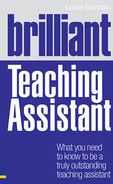Introduction
Why become a teaching assistant?
‘We get all the best bits!’
‘We get all the joys of teaching but without the hassle’
‘We get to spend time with the children and have time to talk to them’
‘It’s great, it’s fun and I can just go into work and go home again without having to do too much preparation’
‘It’s great to be in the school environment and we don’t have the same pressure as teachers’
All of the above quotes were given by teaching assistants working in schools. If you have bought this book, you are interested in finding out whether you are or could become a Brilliant Teaching Assistant. This may be for a number of reasons:
- •because you are new to the role;
- •because you would like to find out more about what similarities and differences there are between jobs and schools;
- •because you may be thinking about taking the plunge and going back into work or training after a career break.
Alternatively, you may be quite experienced and want to find out more about different aspects of what teaching assistants do and broaden your horizons even further. Whatever your reasons, you will want to look at the range of opportunities available to you and consider how teaching assistants can really make a difference to pupils in many ways. From supporting teaching and learning to mentoring and providing a listening ear to pupils, teaching assistants are a vital part of the whole school team.
Support staff have always been in schools, but in 2002 the government started to give large amounts of funding to ‘professionalising’ their role and making specific qualifications available. According to data released in May 2010 by the Department for Education, the total number of teaching assistants in local authority-maintained English schools rose from 79,000 in 2000 to 190,000 in 2009. The impact of this has been huge and has meant that in some schools, the number of teaching assistants is now almost as high as the number of teachers.
Teaching assistants are now qualified to different levels, from HLTAs (Higher Level Teaching Assistants), Level 2 and 3 NVQs (at around GCSE and A level) in Supporting Teaching and Learning in Schools. Teaching assistants have also been able to undertake the Support Work in Schools (SWiS) qualification which has been available to anyone in school who works as a member of support staff. At the time of writing further new qualifications are being developed. Teaching assistants may also have a specialism in areas of special educational needs (SEN), or take intervention groups with specific pupils. This means that they will often have precise responsibilities, be part of a curriculum area, or have to plan, teach and assess pupils independently whilst reporting back to teachers.
As an ‘extra pair of hands’ in the classroom, teaching assistants are now an essential part of the school team and one which most teachers can seldom do without. Although this change has been gradual, the different roles which have evolved are now hugely varied and assistants are now taken on with widely differing job descriptions – something which would not have happened 10 or 15 years ago. Teaching assistants may work in a number of different roles in one school, or have different jobs in different places. Consider the examples below.
 brilliant examples
brilliant examples
Sarah
Sarah works in a large secondary school alongside 20 other teaching assistants and individual support assistants (ISAs). She has a Maths degree and works closely with the Maths teacher, preparing resources and supporting both gifted and talented groups in the lower school and those working below age expectations in Years 10 and 11.
Carole
Carole works in a two-form entry primary school and supports the class teacher in Year 1 during the mornings. She arrives at school at 8.45 and speaks briefly to the teacher before working alongside small groups for literacy. She then spends afternoons with different year groups as she supports the ICT technician and various class teachers. This gives her the opportunity to develop her interest in ICT.
Ian
Ian works in a small village primary school. He arrives at school at 7.30 and helps with breakfast club until school starts. He then works in Year 6 supporting literacy and numeracy groups in the morning before covering lunchtime. He then goes home. After school he comes back to work with after school club.
Whatever your role, you will need to be able to turn your hand to most things in school – this may be anything from dealing with an injured or distressed pupil to invigilating exams or organising costumes for the Christmas play. However, as you become more experienced you will probably find there are some areas you are more comfortable with, and be able to express your interest. This is one of the great advantages of your job – you should be able to develop areas in which you have a particular strength or enthusiasm! This book will guide you through these different aspects of your role and also those of others in your school team so that you can see how you fit in to the school as a whole. It also provides several Brilliant case studies, the solutions to which can be found in Appendix 1.
